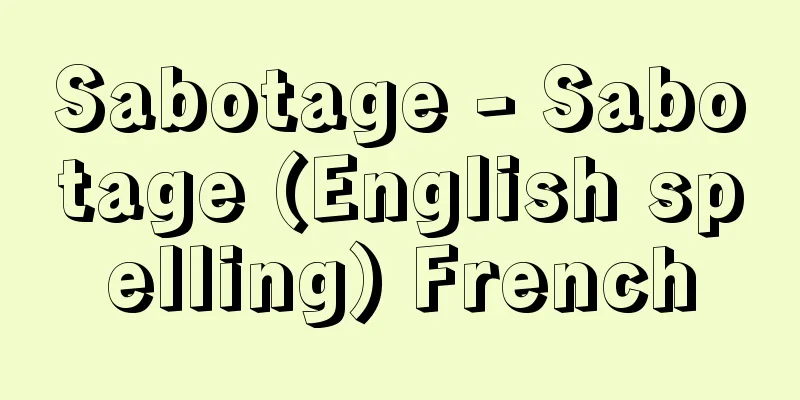Sabotage - Sabotage (English spelling) French

|
One of the means of labor disputes. It is usually understood to mean slow work, but there are various theories about its origin. The most common theory is that sabot means wooden shoes in French, and that during labor disputes, workers would put wooden shoes into machines to stop production, or wear wooden shoes and make them rattle, reducing efficiency, and so the name was given to this act of slow work. There are three types of sabotage: (1) active sabotage, which disrupts operations by destroying machines or products or intentionally producing defective products; (2) open sabotage, which disrupts operations by speaking ill of the employer or products to outsiders; and (3) passive sabotage, which intentionally does not follow the employer's orders or commands while continuing to work in an outward appearance. In Japan, the term is usually used in the sense of (3). Other examples of passive sabotage include repeated time-limited strikes, partial strikes (only some union members are allowed to strike), which are carried out in rotation by workplace, upper-level blocking strikes that stop contact with the employer and the management, and payment strikes in which the union keeps the collected money. This dispute tactic keeps the workers in the workplace, so it is easy to block the employer's counter-dispute actions. In addition, since the workers are still working, it is difficult to cut wages. There are few cases where a dispute other than passive sabotage can be considered legitimate. [Mikio Yoshida] [Reference] |Source: Shogakukan Encyclopedia Nipponica About Encyclopedia Nipponica Information | Legend |
|
労働者の争議手段の一つ。通常、怠業の意味で理解されているが、語源については諸説ある。代表的な説は、フランス語で木靴(きぐつ)のことをサボsabotといい、争議のとき木靴を機械に投入して生産を停止したり、木靴を履き、カタカタさせて能率を低下させたところから、労働者が行う怠業的行為にこの名がついたとする。 サボタージュには、(1)機械や製品などの破壊をしたり、故意に不良品を生産することにより業務を妨害する積極的サボタージュ、(2)使用者や製品の悪口を外部に向けて行うことにより業務を妨害する開口サボタージュ、(3)外形的には仕事を継続しながら、意識的に使用者の指揮命令に部分的に服しない消極的サボタージュがあり、日本では(3)の意味で用いるのが普通である。時限ストを繰り返したり、部分スト(組合員の一部だけに行わせる)を職場ごとで交替して行う場合や、使用者および職制への連絡をストップする上部遮断スト、集金した金銭を労働組合のほうで保管する納金ストも一種の消極的サボタージュである。この争議戦術は労働者が職場にとどまるものであるため、使用者の争議対抗行為を封じやすい。また、労働者がいちおう仕事をしているので賃金カットも困難である。消極的サボタージュ以外は正当な争議行為といえる場合は少ない。 [吉田美喜夫] [参照項目] |出典 小学館 日本大百科全書(ニッポニカ)日本大百科全書(ニッポニカ)について 情報 | 凡例 |
<<: Zapoteco - Zapoteco (English spelling)
>>: Sapodilla - Sapodilla (English spelling)
Recommend
tājir (English spelling) tajir
In particular, commercial trade with the world at...
Yellow cucumber - Cucumber
Scientific Name: Cucumis sativus Plants. Annual vi...
Heberer, G.
...This theory states that modern humans descende...
Lawn Tennis Championships on Grass
…The world's oldest tennis tournament, which ...
Sanmai - Scattered rice
〘 noun 〙 When performing a Shinto ritual, rice is ...
Castro
…The most representative poets of the fin de sièc...
Genus Asarum - Asarum
…Local varieties of Kan-aoi include Suzukakan-aoi...
Gardenia japonica - Gardenia japonica
A semi-parasitic biennial plant of the Scrophular...
Raseśvara (English spelling)
...For the teachings of this sect, see the entry ...
007 Series - Zero Zero Seven Series
An international action and adventure series starr...
Echigo Aosozza
...During the Sengoku period, the Nagao clan rose...
Narrow Haori - Narrow Haori
…Haori was treated as casual attire because it wa...
Guiana spiny rat - Guiana spiny rat
…A general term for mammals in the genus Echimys ...
Asiantum - Asiantum
A general term for the genus Pavodina in the Pter...
Ushakov, FF - Ushakov
...The Empress placed importance on agriculture, ...









